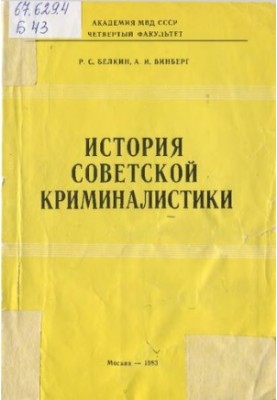History of Soviet criminology. Formation of private criminological theories
 Instant download
Instant download
after payment (24/7)
 Wide range of formats
Wide range of formats
(for all gadgets)
 Full book
Full book
(including for Apple and Android)
The History of Soviet Criminology . The formation of Belkin’s private forensic theories is a profound and fascinating study that immerses the reader in the world of criminology as a science and its evolution into the Soviet period. The author, possessing extensive knowledge in the field of law and criminology, offers readers a unique opportunity to trace how the theories and practices that formed the basis of modern criminal proceedings in Russia have developed. The book begins with the historical context in which Soviet criminology was formed. Belkin masterfully describes how political, social and economic changes in the country influenced the development of this science. The reader will learn about the first steps in criminology, how the first theories and methods of investigating crimes were created, and how they adapted to the needs of Soviet society. This is not just dry facts, but a fascinating story that allows you to feel the atmosphere of time and understand the challenges faced by scientists and practitioners. The book will be of interest not only to specialists in the field of law and criminology, but also to a wide audience, including students, historians, as well as anyone interested in the development of science and its impact on society. If you are interested in detective stories, crime novels or just want to understand how the justice system works, then this work will be a real discovery for you. It will help you to look at forensics not only as a set of methods, but also as a living science that is constantly evolving and adapting to new challenges. One of the key themes of the book is the interaction of theory and practice in criminology. Belkin emphasizes how important it was to develop private forensic theories that assisted investigators in their work. He analyzes how different schools of thought and approaches to the investigation of crimes were formed under the influence of both domestic and foreign scientists. This creates a rich palette of ideas and concepts that still influence modern forensics. Belkin's style distinguishes clarity and accessibility of presentation, which makes complex scientific concepts understandable to a wide audience. It masterfully combines historical analysis with practical examples, which allows the reader not only to learn about the theoretical foundations, but also to see how they were applied in practice. This makes the book not only informative, but also fascinating .. If you are interested in other works in the field, you may like books by authors such as Alexander Benkendorf or Viktor Burtsev, which also deal with the topics of forensics and criminal procedure. Searches related to this book may include "Criminalistics in the USSR", "Criminal Law History", "Crime Investigation Methods" and "Soviet Science".[citation needed] The History of Soviet Criminology . The formation of private forensic theories is not just a book, but a whole world that opens up new horizons for the reader to understand criminology as a science. It is worthy of attention not only of specialists, but also of everyone who wants to understand more deeply how the justice system works and what theories underlie it. Immerse yourself in the fascinating journey through the pages of this book and discover the secrets it holds.
LF/104888306/R
Data sheet
- Name of the Author
- Белкин
- Language
- Russian

























